|
|
|
Sort Order |
|
|
|
Items / Page
|
|
|
|
|
|
|
| Srl | Item |
| 1 |
ID:
131686
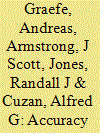

|
|
|
| 2 |
ID:
165593
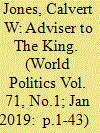

|
|
|
|
|
| Summary/Abstract |
Do experts rationalize and legitimize authoritarian governance? Although research on expert actors in contexts of democracy and international governance is now extensive, scholarly work on their role in authoritarian settings remains limited. This article helps open the black box of authoritarian decision-making by investigating expert advisers in the Arab Gulf monarchies, where ruling elites have enlisted them from top universities and global consulting firms. Qualitative fieldwork combined with three experiments casts doubt on both the rationalization and legitimacy hypotheses and also generates new insights surrounding unintended consequences. On rationalization, the evidence suggests that experts contribute to perverse cycles of overconfidence among authoritarian ruling elites, thereby enabling a belief in state-building shortcuts. On legitimacy, the experiments demonstrate a backfire effect, with experts reducing public support for reform. The author makes theoretical contributions by suggesting important and heretofore unrecognized conflicts and trade-offs across experts’ potential for rationalizing vis-à-vis legitimizing.
|
|
|
|
|
|
|
|
|
|
|
|
|
|
|
|
| 3 |
ID:
099464
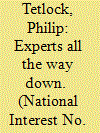

|
|
|
| 4 |
ID:
164406
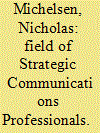

|
|
|
|
|
| Summary/Abstract |
Communication has long been accepted as integral to the conduct of international affairs. The role that discourses, ideas, norms, and narratives play at the systemic level of world politics has been examined extensively. Scholarly interest has now turned to how international actors use political communication tools to create and counter threats, such as propaganda, hybrid warfare, fake news, and election tampering, and it is often taken for granted that states are inferior to their challengers in these domains. To address this, ‘Strategic Communications’ has emerged as a mode of thought and practice promising to enhance state communication; encompassing long-established activities including public diplomacy, public relations, nation branding, and information operations. In this developing field, private sector professionals are increasingly being called on to support and advise governments. Particular attention has been paid to the ‘Big Data’ private companies may have access to, but there has been little IR research examining the experts seeking changes in how strategic communications is practised. Informed by elite interviews with communication professionals across the public-private space, this article sets out a research agenda to fill this gap, enhancing understanding of the expert relationships that shape international strategic communications.
|
|
|
|
|
|
|
|
|
|
|
|
|
|
|
|
| 5 |
ID:
175557
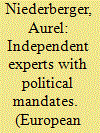

|
|
|
|
|
| Summary/Abstract |
Some experts take on political mandates and simultaneously base their authority on a claim to independence: this balancing act enables international organisations (IOs) to incorporate ‘independent’ experts and generate ‘objective’ knowledge around their policies. However, how do these experts reconcile the contradictory roles of a mandated expert and an independent expert? I address this question by taking recourse to Goffman's sociology and two related concepts: sociological ambivalence refers to situations in which a person faces conflicting expectations. This conflict can be remedied through role distance, that is, behaviour that signals a degree of disaffection from the role one is currently performing while one simultaneously continues to perform that role. I conduct a case study of ‘independent’ experts hired by the UN Security Council to monitor sanctions, analysing how their position is sociologically ambivalent and how their knowledge practices are interlaced with performances of role distance. The findings have two implications for macro-phenomena: first, by keeping their contradictory role constellation functional, experts make it possible for IOs to mobilise ‘independent expertise’. Second, because experts perform role distance through the way they produce knowledge, role distance leaves traces in political knowledge.
|
|
|
|
|
|
|
|
|
|
|
|
|
|
|
|
| 6 |
ID:
156790
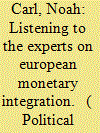

|
|
|
|
|
| Summary/Abstract |
I would like to thank Dr Schelkle for writing an interesting and instructive comment on my article. While there is much to agree with in her comment, there are also a number of points that I wish to contest. I will take these points in turn.
|
|
|
|
|
|
|
|
|
|
|
|
|
|
|
|
| 7 |
ID:
102396
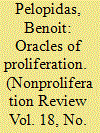

|
|
|
|
|
| Publication |
2011.
|
| Summary/Abstract |
By examining via a case study the political authority of US proliferation experts since the 1960s, this article contributes to nuclear weapons proliferation studies and to the growing literature on the role of expertise in democracies. First, it argues that policy choices are determined by an understanding of history and that approaching nuclear history as a history of nuclear weapons proliferation is a presumption shared by both US experts and policy makers. Second, it shows that this understanding of history, relying on the metaphorical use of the term proliferation (which was imported from biology), strongly distorts the facts. Third, the article shows that nuclear experts are plagued by a conservative bias as a result of this use of the proliferation metaphor. Instead of challenging the faulty proliferation narrative, most experts have backed it without question. Fourth, the legitimacy that experts lend to this view of history has important political effects: it provides an authoritative assessment of past policies and limits the possibility of political innovation. Policy initiatives tend to be restricted to changes in speed or intensity. The article suggests three changes that might restore room for informed political innovation in nuclear weapons policies.
|
|
|
|
|
|
|
|
|
|
|
|
|
|
|
|
| 8 |
ID:
178808
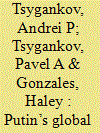

|
|
|
|
|
| Summary/Abstract |
Despite the reputation of being objective and non-partisan, experts
frequently validate concepts and ideas popular within the dominant elite
circles. To support this argument, we have taken a closer look into the
Atlantic Council (AC), an American think tank with clear preferences for the
U.S.-centered international order and NATO as the foundation of security in
Europe. We argue that these preferences have translated into anti-Russian
bias in AC publications. This is evident in the organization’s reliance on
the concept of global hybrid war in describing goals and means of Russian
foreign policy since 2014. We base our analysis on a sample of articles on
Russia and “hybrid war” published by the AC’s experts between 2014 and
2020. In establishing the AC’s pro-NATO and anti-Russian biases, we analyze
the articles’ frames as well as the political and institutional preferences held
by the organization.
|
|
|
|
|
|
|
|
|
|
|
|
|
|
|
|
| 9 |
ID:
117797
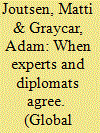

|
|
|
|
|
| Publication |
2012.
|
| Summary/Abstract |
The UN Convention Against Corruption is the only truly global convention in corruption control. Separate and rather difficult negotiations were conducted on a mechanism for the implementation of the treaty. These negotiations broke ground by providing, for the first time, peer review of a United Nations treaty. This article, which is based on the authors' close observations and interviews with key participants, seeks to show how the dynamics between technical experts and diplomats led to a resolution that would not have occurred if either the technical experts or the diplomats had acted alone.
|
|
|
|
|
|
|
|
|
|
|
|
|
|
|
|
| 10 |
ID:
099263
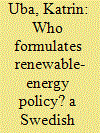

|
|
|
|
|
| Publication |
2010.
|
| Summary/Abstract |
A broad participation by stakeholders and an extensive reliance on expert advice are often seen as preconditions for a legitimate and successfully implemented renewable energy policy. However, we have lacked systematic data for testing this argument. This article's contribution is to examine the actors who take part in the making of Swedish energy policy with the help of data on the composition of various committees of inquiry over the last twenty years (1988-2009). Swedish renewable energy policy is often characterised with words like "pioneering" and "forerunner", suggesting that the policy-making process in this area engages many different experts and stakeholders. Our data give only some support to this argument. Results point to a noteworthy predominance of politicians, civil servants, and representatives of state agencies within the policy-process. Producers of uranium and fossils based energy have been engaged more often than producers of renewable energy. Experts have played a prominent role, but this is mostly due to the participation of expert bureaucrats rather than of scientists. The study suggests that a better understanding of the making of energy policy, both in Sweden and elsewhere, requires greater attention to the networks and role of various state employees.
|
|
|
|
|
|
|
|
|
|
|
|
|
|
|
|
|
|
|
|
|